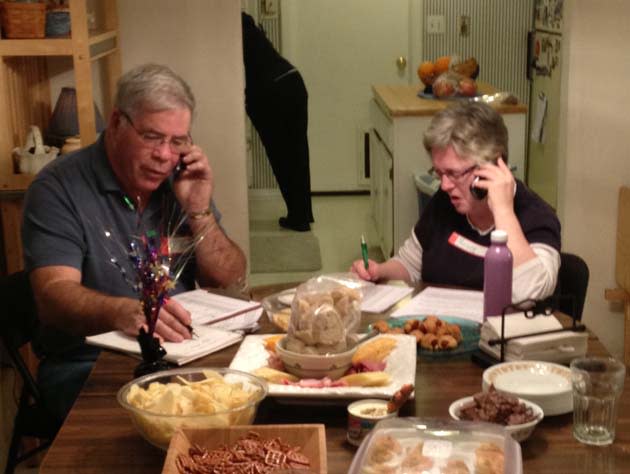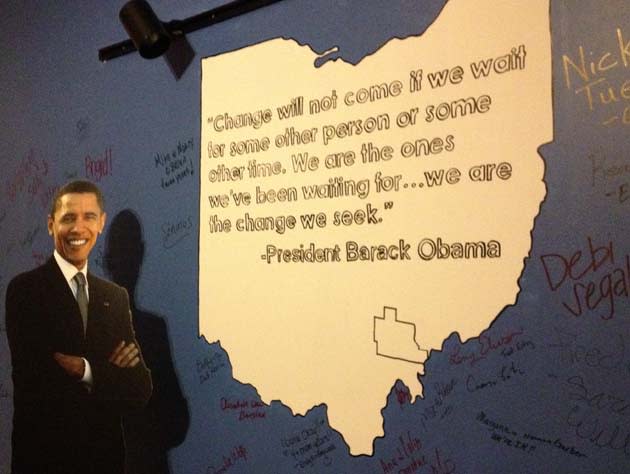 The Ticket
The TicketObama’s re-election campaign quietly organizes while Republicans fight

BEAVERCREEK, Ohio—President Barack Obama's supporters waited all of two months after his inauguration to start laying the groundwork here for what has become a re-election machine that is bigger and tougher than his would-be Republican rivals' nightmarish imaginings.
Oh, I'm afraid the Obama campaign will be quite operational when his Republican challenger arrives.
Powerful, the president's re-election effort is: A new NBC News/Marist poll finds Obama trouncing his opponents in hypothetical general-election matchups in this state. He leads Mitt Romney in Ohio by 12 points among registered voters, 50 percent to 38 percent; Ron Paul by 10 points, 48 percent to 38 percent; Rick Santorum by 14 points, 50 percent to 36 percent; and Newt Gingrich by 15 points, 51 percent to 36 percent.
While the seesaw battle for the Republican Party's presidential nomination has grabbed the news media spotlight, the unopposed Democratic incumbent has quietly worked to enlist new supporters and woo back the armies of volunteers and small donors who powered his historic victory in 2008.
Supporters like Sarah Williams, a 24-year-old student at Ohio University in Athens, are among the campaign's most important assets: veterans of the '08 effort who are at least as enthusiastic now as they were four years ago.
"I'm passionate about the president," Williams told Yahoo News as the campaign opened a field office in Athens. "He ran on change, he delivered on that change, and now we have to protect it."
Williams calls her brief meeting with Michelle Obama on Feb. 23, 2008, "the day that changed my life," leading her to change her major from creative writing to political science ("my concentration is 'elections'"), to volunteer for Obama's presidential campaign—and now, in 2012, to volunteer for his re-election effort. She views her job as "getting people excited again," she said.
A senior official with the president's re-election campaign in Ohio, asked by Yahoo News how the Obama campaign is reaching out to its volunteers from 2008, replied, "We never stopped talking to them."
Organizing for America, on operation run by the Democratic National Committee that grew out of the movement that swept Obama into the White House, resumed operations in Ohio in March 2009—more than two years before the president's re-election effort formally began on April 4, 2011.
"Literally two months after the president's been inaugurated, we're on the ground with paid staff," the senior official told Yahoo News. The campaign made the senior official available to Yahoo News on the condition that he not be named.

Obama's backers in Ohio have been repeatedly tested, first with the fights over his landmark laws on health care law and Wall Street regulation, followed by the Democratic rout in the 2010 midterm elections, and finally in their successful campaign to roll back "Issue 2"—a Republican-backed drive to curb the power of public-sector unions.
"You leave the 2010 cycle demoralized, but 2011 reinvigorates your volunteers," the Obama senior official said. "And organization builds on action."
The Obama campaign has created "neighborhood teams" to enlist and motivate its volunteers, relying on the time-honored—well, honored since at least 2004, when Karl Rove used the same tactic to help George W. Bush win Ohio and, thus, re-election—political principle that the strongest endorsement a voter can hear comes from a friend or neighbor.
Matt Caffrey, a retired Air Force colonel, made that point to the North Beavercreek and Fairborn neighborhood team—a dozen friends and neighbors sitting on the vast blue sofa of his living room or on folding chairs, near a table piled high with snacks and a blue bag full of campaign-funded cellphones.
"Be polite," he emphasized as they prepared to call area voters. "The biggest thing about neighborhood teams is: We really are neighbors." (His polite policy extended to this reporter—he gave Yahoo News a copy of the call script.)
He added, "That's so much more persuasive because people are much more likely to believe somebody who lives down the street than somebody who lives across the country."
Powered by its neighborhood teams, the Obama campaign has spoken to some 650,000 voters in Ohio—by telephone, knocking on doors, or with volunteer meetings—the senior official said.
"People come because they support the president. But they stay because they're part of a team, a team of people, many times, that they know and see every day," the senior official said.
The campaign has mounted a national drive to reconnect with "every single volunteer or small donor" from the 2008 campaign, a push called "I'm In," according to an aide at the Obama campaign's Chicago headquarters.
"I'm In" has already reached more than 1 million people, according to the campaign.
But the campaign declined to share the effort's yield—how many of those reached have responded by giving money or time—which would help gauge whether it is recapturing the political magic of the 2008 campaign.
The campaign has kept up a similarly aggressive pace in other battleground states like Pennsylvania and Florida, according to figures compiled and shared by a senior aide. The campaign declined to provide a state-by-state rundown of numbers of volunteers or other telling statistics, saying it did not want to tip its hand to its eventual Republican rival.
Since the president formally launched his re-election bid on April 4, 2011, Obama For America's Pennsylvania operation has made some 456,000 telephone calls, held more than 5,300 one-on-one meetings with supporters looking to learn more about getting involved with the campaign, and collected and delivered more than 47,000 signatures to get the unopposed incumbent on the ballot. The campaign has seven offices across the Keystone State.
In Florida, the campaign has held some 4,000 training or planning sessions, house parties and phone banks, and more than 5,000 one-on-one meetings with potential volunteers, and it has opened 12 offices across the Sunshine State—from headquarters in Tampa (where the Republicans will hold their nominating convention) to field operations in Jacksonville, Tallahassee, Orlando, St. Petersburg and Palm Beach, as well as Miami-Dade and Broward counties.
Republicans whose job it is to track these things acknowledge that the Obama campaign's efforts are impressive, but they say their party's eventual nominee can make up some ground quickly—because the Republican National Committee and Republican governors will swing behind the challenger in a show of unity.
"It's not apples-to-apples," said Ryan Williams, a spokesman for Mitt Romney, when asked about Obama's 9-to-1 edge in field offices in Ohio. "Our effort in the state is not comparable to the president's at this point, given that he has the entire DNC and OFA"—Democratic National Committee and Organizing for America—"infrastructure behind him. Gov. Romney will inherit the party organization when he is the nominee."
Romney's Ohio headquarters failed to respond to several emails from Yahoo News over several days—and no one even answered the phone, much less responded to voice-mail messages.
"Obama's going to have a well-oiled, well-funded machine, no doubt, " said Austin Barbour, one of Romney's national finance chairmen and a key organizer of the campaign's ground game in New Hampshire, Florida and Michigan.
"We've got to take care of business: Win the primary first, then we can focus on the general," he told Yahoo News by telephone.
Olivier Knox is the White House correspondent for Yahoo News.
More popular Yahoo! News stories:
• Poll: Santorum slightly ahead in Ohio before Super Tuesday
• Mitt Romney wins the Washington state caucuses
• Santorum bets on Ohio for Super Tuesday
Want more of our best political stories? Visit The Ticket or connect with us on Facebook, follow uson Twitter, or add us on Tumblr. Handy with a camera? Join our Election 2012 Flickr group to submit your photos of the campaign in action.
